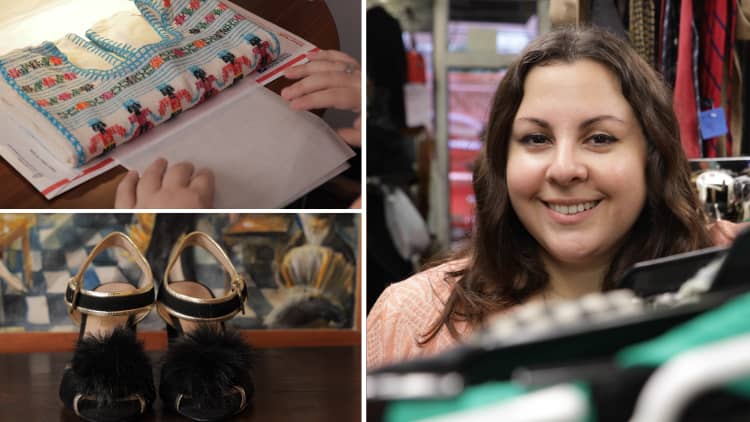When Natalie Gomez left her job as a merchandise planner at Macy's, she hadn't planned on becoming her own boss. But, only a few weeks into interviewing for her next role, she realized that maybe she wouldn't need another full-time gig.
Gomez was already making thousands selling clothes out of her closet.
"I thought, 'Let me just between interviews feel like I am making some money and doing something so I kind of don't feel bad about not working.' It kind of took off and I never went back," she tells CNBC Make It.
The platform that made her side hustle possible was Poshmark, a site that launched in 2011 as equal parts online retail and fashion curation. It takes a 20 percent cut of items sold for more than $15. After reading about other sellers finding success selling their own used clothing, Gomez thought she'd try her hand at selling a dress in February 2016.
It was black-and-white with printed cats and pockets. "It wasn't even a very good dress to start with," Gomez says. She took a couple of photos from her phone and posted the quirky piece for sale on her storefront.
It sold in less than 24 hours for $40.
After burning through most of her unwanted clothes from her own closet, she branched out into buying clothes from retailers like Anthropologie, Zara and even thrift stores around New York, with the sole purpose of flipping the items and making a profit.
"I actually started selling things pretty quickly and I thought, 'I'm not going to spend this money, I'm just not going to go back to a regular office job,'" she recalls.
What started as a single, nervous purchase of a $9.95 dress she wasn't sure she'd be able to resell became a full-fledged business. As she ramped up, Gomez saw her studio apartment transform into more of a stockpiling center with over 1,000 pieces of inventory neatly folded and hung across two closets and clothing racks.
As sales approached $10,000 in a single month, she invested more money back into the operation. "I've been on a shopping trip where I've spent a couple thousand dollars," she says.
After about eight months, Gomez opened a second online store featuring clothes she sources from thrift stores around her parents' home in Austin, Texas. Her father, a retired Coca-Cola employee, ships items on Gomez's behalf, though he sometimes questions exactly how reselling clothes online became his daughter's full-time job.
"He said, 'Get yourself a nice office job and get good benefits and you'll be happy,'" Gomez says. "But, you know, I think it's kind of our generation that says, 'I don't want that, I want to work on my own terms.'"
While sometimes that means having the flexibility to shop and peruse stores for sales with friends at her leisure, Gomez says she spends about 60 to 80 hours a week shopping, posting clothing listings, and processing some of the 300 orders she ships in a month.
Not all of Poshmark's sellers are as invested as Gomez is. According to the company's CEO Manish Chandra, only about 10 percent of the platform's three million sellers are selling clothes in a part-time or full-time capacity.
"The rest of them are doing it in a more casual way," he says. "But that number of people who are starting to find this to be a meaningful part of their life is increasing steadily on the platform."
Younger shoppers, many of whom have become accustomed to online shopping, have also embraced the idea of resale platforms like Poshmark, ThredUp and Material Wrld.
Roughly 36 percent of teens aged 14 to 19 have used online resale platforms for clothes and furniture. That's about the same number of those that reported shopping at specialty retailers like J. Crew in the last six months, according to a recent survey from research firm Cassandra.
Assuming that trend continues, the path Gomez took to become her own boss could become more well-traveled.
"I always wanted to work for myself," she says. "I always wanted to have my own business and I knew there were things that I was good at. I just didn't know how to translate that into actual money."
After crossing the six-figure mark in total sales, that's not the case anymore.
Like this story? Like CNBC Make It on Facebook!
Don't miss:




